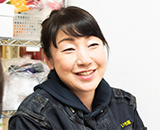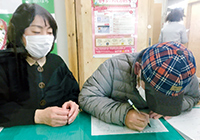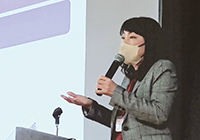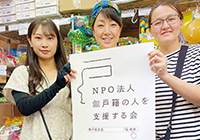
Award summary
According to the Japanese Ministry of Justice, 785 stateless people live in Japan as of January 2023, but it is believed that this number is actually higher. The most common reason for a person to become stateless is that their parents failed to submit a notification of birth, but there are many different factors in a person becoming stateless, such as the incompleteness of a repatriate's postwar immigration procedures or the inability to obtain a notification of birth due because a person gave birth alone without the help of a doctor or midwife. Stateless people cannot have a certificate of residence issued, sign up for national health insurance, receive medical attention at a hospital, go on to higher education or open a bank account. They encounter many obstacles in their everyday lives. The enforcement of the Individual Number system also prevents stateless people from getting jobs.
Based in Nara City, Ms. Mayumi Ichikawa is a 55-year-old representative of a nonprofit organization named Association that supports people without a family register. It has been helping stateless people to obtain family registers and certificates of residence since 2018. She takes time away from her business to travel around the country and help people obtain family registers, etc. These activities dates back to 2016. Because of the enforcement of the Act on the Use of Numbers to Identify a Specific Individual in Administrative Procedures, she asked an employees of the event goods distributor she operated who was in their 20s to show her their individual number card. The employee did not have one. Ms. Ichikawa went to the municipal office and learned that no notification of birth had been issued for the individual, who was found to be stateless. Partly because of the employee's wishes, Ms. Ichikawa started helping with their obtaining a family register without taking the matter too seriously. However, the employee had no identification, which made it difficult to talk with the municipal office and the legal affairs bureau. Obtaining a family register requires an age certification. Ms. Ichikawa tried to find the hospital the employee had been born at. The only clue was the information that it was somewhere in Okinawa. She could not find it. Ms. Ichikawa talked with the employee's mother and acquaintances and gathered related photos from the past and other materials to provide evidence of the individual's birth. After one year and eight months of persevering in negotiations with the municipal government and other institutions, the employee was finally able to obtain a family register.
Ms. Ichikawa keenly felt that obtaining a family register or anything else of that sort would require a tremendous amount of effort, time and negotiation skills. Some stateless people become discouraged halfway through the process due to the unfriendly response of the local government. Motivated to use her experience to support stateless people, Ms. Ichikawa set up a nonprofit organization herself in 2018. Every day, Ms. Ichikawa is contacted by three to five people from all around the country. Currently, she is supporting three people and is talking with six others. Considering the person's circumstances, Ms. Ichikawa talks to all people who might be able to provide information, such as the school the person attended, companies they have worked for, welfare commissioners, neighbors, friends and acquaintances. She gathers evidence about when the person was born and how they have lived. She negotiates with a broad range of institutions such as local governments, family courts, legal affairs bureaus, immigration offices and the police. It normally takes more than one year to obtain a family register. To date, she has helped six people obtain family registers, one person acquire Japanese nationality and 13 people obtain a certificate of residence.
Obtaining a family register is not the end of the process. Once a person obtains a family register, they must pay national pension premiums and taxes. Some people may need assistance even after obtaining a family register. People who have never attended school, worked for a company or been a part of any other organization because they are stateless must receive vocational training so that they can find a job. "If I see someone that is in trouble, I cannot walk away or ignore it. This is who I am and it is why I keep doing this job," says Ms. Ichikawa who has empathy for the people who come to her for help. She is a "life companion" for them, doing everything she can to support people who need help.
 She accompanies patients to procedures and negotiations so that they will not feel uneasy.
She accompanies patients to procedures and negotiations so that they will not feel uneasy. She gives many lectures and seminars to raise awareness.
She gives many lectures and seminars to raise awareness. She joins university students in volunteer activities.
She joins university students in volunteer activities. She thinks over what makes the person happy, and pursues that together with them.
She thinks over what makes the person happy, and pursues that together with them.Reasons for this award
Obtaining a family register and similar processes are tremendously labor and time consuming. We take our hats off to Ms. Ichikawa for her continued support activities that she does alone, balancing them and her own work. You can easily see that Ms. Ichikawa is serious in her efforts with each stateless person, who she has empathy for. It started with helping an employee obtain a family register. The experience promptly led her to set up an NPO and start supporting stateless people. We are amazed by her ability to act and implement plans. We wish the issue of statelessness had broader recognition and that people were more understanding of stateless people.
Comments from the winner
I am really grateful to the awarding organization for this opportunity to enable more people to learn about the word "stateless," the existence of stateless people and the things that I am doing to help these people. People in these situations often conceal the facts, and if we can provide these people with more places to learn, we can help them not give up on life. Really, we can save lives. Receiving the award has convinced me that my motto, "Believe in people and take action accordingly," is right. I will stay true to this and continue to be a "life companion" to stateless people.






